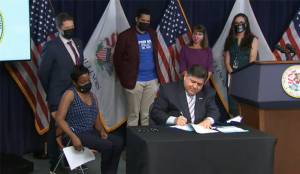Mental health first responder, insurance coverage bills among latest
signed by Pritzker
 Send a link to a friend
Send a link to a friend
[August 26, 2021]
By JERRY NOWICKI
Capitol News Illinois
jnowicki@capitolnewsillinois.com
 SPRINGFIELD – Gov. JB Pritzker has been
steadily acting on more than 660 bills sent to him by the General
Assembly this year ahead of a weekend deadline for bill action. SPRINGFIELD – Gov. JB Pritzker has been
steadily acting on more than 660 bills sent to him by the General
Assembly this year ahead of a weekend deadline for bill action.
On Wednesday, he signed House Bill 2595, which beginning in 2023
requires insurers to provide coverage to all medically necessary mental
health care in Illinois, including for mental, emotional, nervous or
substance use disorders.
He also signed House Bill 2784 to create a mental health first responder
system in coordination with an emergency mental and behavioral health
phone system that was created by federal law.
The Division of Mental Health of the state’s Department of Human
Services is preparing to coordinate mental and behavioral health
services to all Illinoisans as part of the federally mandated adoption
of the 988 phone number. The number is expected to go online by July
2022.

The new law will require 911 call center operators to coordinate with
the mobile mental and behavioral health services that are being
established through the Division of Mental Health, which is also
establishing regional advisory committees in each Emergency Medical
Services region.
Pritzker has signed more than 570 bills thus far and vetoed a handful.
The governor has 60 days from when he received the bills from the
General Assembly to either sign or veto them, after which time period
the bill becomes law even without his signature.
For the bills that are vetoed, lawmakers will return in the fall to
consider overrides or acceptance of the governor’s changes.
Most of the remaining 82 bills were sent to him at the end of June, so
the 60-day clock coincides with the end of this week for all but a few
of them. Below are a few of the bills he has acted on in recent days.
Other bill action
Sex education: Pritzker on Friday signed Senate Bill 818, which creates
a new “personal health and safety” curriculum for grades K-5, and a
“sexual health education” curriculum for grades 6-12. The bill received
resistance from Republican lawmakers and religious groups for its
“culturally appropriate” guidelines, including education on gender
identities, different types of families, sexual orientation, consent and
a woman’s options during pregnancy.
Parents can opt their students out of the coursework without penalty,
and each individual school district may determine whether it will teach
sex education. If a district offers the subject, the curriculum must use
all or part of the curriculum established by the bill.
The actual statewide curriculum would be developed by the Illinois State
Board of Education by Aug. 1, 2022.
But many of the guidelines contained in the statute require that sex ed
curricula be aligned with National Sex Education Standards, an
initiative by non-government organizations to provide “guidance on
essential minimum core content and skills needed for sex education that
is age-appropriate.”

The guidelines, for example, require students by the end of second grade
be able to define consent, personal boundaries, child sexual abuse and
how to report child sexual abuse to a trusted adult.
Sexting education: The governor also signed House Bill 24, requiring
classes that teach sex education to include an age-appropriate
discussion regarding sexting. That discussion would include information
on possible consequences of sharing, possessing or forwarding sexually
explicit content, as well as the importance of internet safety. It took
effect immediately.
Construction transparency: Pritzker signed House Bill 253, which
requires the Illinois Department of Transportation to establish and
implement a transportation performance program for state projects. IDOT
is also required to develop a statewide highway system asset management
plan aimed at preserving and improving roadways while reducing costs.
The department is instructed to develop a performance-based process for
selecting which projects will be prioritized. The bill passed both the
House and Senate with unanimous, bipartisan support. It applies after
January 2022.
[to top of second column]
|

Gov. JB Pritzker signs a pair of bills aiming to
increase access to mental health resources in Illinois. (Credit:
Blueroomstream.com)

Journalism task force: Pritzker signed Senate Bill
134, creating a Local Journalism Task Force made up of 13
individuals representing print and broadcast media, journalism
schools, and state and local government. The group will study
communities underserved by local journalism, as well as reviewing
print and digital business models, the impact of social media and
how to improve news access. It takes effect January 2022.
Underage e-cig sales: Pritzker signed Senate Bills 512 and 555,
prohibiting e-cigarette and vaping marketing that targets children
and ensuring vape shop compliance with the state’s minimum
purchasing age of 21. The law allows underage individuals to test a
retailer’s compliance as part of a compliance check in conjunction
with law enforcement. They will go into effect January 2022.
Vetoes
Thus far, the governor has issued three vetoes and two amendatory
vetoes, including one of the budget bill that needed the amendatory
action because of omitted effective dates.
Maternal health: One Pritzker amendatory veto aims to fix a
technical issue on a bill he noted he supports. The measure, Senate
Bill 967, will expand the current Illinois Medicaid plan “so that
individuals who don’t qualify for full benefit Medicaid still have
coverage for preventive contraceptive care and associated screenings
related to reproductive well-being,” according to the governor’s
office.
The bill passed unanimously, so it shouldn’t be difficult for
sponsors to find the votes to accept the amendatory veto, which
changes only an effective date.
State Sen. Cristina Castro, D-Elgin, the bill’s Senate sponsor,
noted in a news release when the bill passed that it also “would
provide support for pregnant and new mothers for pregnancy-related
condition, including mental health and substance use disorders by
requiring private insurance plans to cover postpartum complications
up to one year after delivery among other requirements.”

Pollution control: While lawmakers passed House Bill 3190 to limit
disposal by “incineration” of certain substances, Pritzker said in a
veto message the definition of “incineration” is too broad, creating
unforeseen increases to greenhouse gas emissions. He urged lawmakers
to pass another bill with the same intent but clearer language.
Wetland protection: Pritzker vetoed Senate Bill 1770, which exempts
construction within a 6-mile radius of the Ohio and Mississippi
Rivers confluence from the provisions of the Interagency Wetland
Policy Act of 1989. He said while he’s a strong supporter of a port
district project in the area, the bill “would unnecessarily turn the
determination of appropriate wetland mitigation over to the Federal
Government by severely restricting the State of Illinois’
involvement in the process.”
Duplicative bill: He also vetoed House Bill 1966, noting in his veto
message that he already signed Senate Bill 1646, a “similar bill
with more expansive provisions” which extends an application
deadline pertaining to members of the Teachers’ Retirement System at
a private school recognized by the Illinois State Board of
Education.
Capitol News Illinois is a nonprofit, nonpartisan
news service covering state government and distributed to more than
400 newspapers statewide. It is funded primarily by the Illinois
Press Foundation and the Robert R. McCormick Foundation.
 |